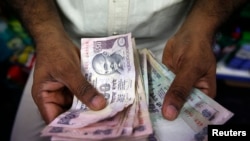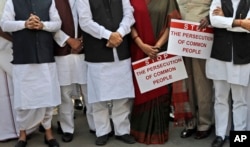As India grapples with massive cash shortages, the government has announced a series of measures to improve the supply of new currency to the vast rural areas that have been worst hit since high value currency bills were scrapped earlier this month.
Economic Affairs Secretary Shaktikanta Das said on Wednesday that the large countrywide network of post offices would be used to distribute money. "The new denomination notes... have been made available in 155,000 post offices across the country to disburse cash, specially to rural people."
The government also said farm cooperatives would provide more than $3 billion in credit to farmers to buy seeds and fertilizer for the winter crop.
There has been mounting hardship in villages, where people hold virtually all their savings in cash. Worries are also growing that food production could be hurt due to delays in planting crops such as wheat.
Cash has been in short supply since 85 percent of the country’s currency went out of circulation in a matter of hours when high denomination bills of about $7.50 and $15 were scrapped on November 8. The move aims to bring billions of dollars of unaccounted wealth into the mainstream economy, stamping out tax evasion and curbing corruption.
The brunt of the cash crunch has been borne by rural areas, where two-thirds of India’s 1.3 billion people live, but where the network of banks is poor, making it a challenge to get new currency bills.
Many villagers have been trekking long distances and waiting in serpentine lines in neighboring areas to exchange their cash for new bills, sometimes to find that new notes run out before their turn comes.
The worst affected are those at the bottom of the rural economy – daily wage workers. Demand for farm labor has fallen as the planting season slows down and even well-off farmers say they do not have enough currency to pay salaries or conduct transactions in the market.
A farmer in Haryana state’s Karnal district, Ishwar Dayal, says although he is allowed to exchange roughly $500 in a week from the bank, that amount is difficult to come by as banks run out of currency. That is hampering his operations. “Our rotation in the village depends completely on cash transactions. Whoever we have to deal with, they have no checks, no check books; they only have trust in taking or giving cash,” he said.
Facing a barrage of criticism for poor preparation and implementation of the massive task of replacing 23 billion old notes, the government has said it could not have printed new bills in advance for fear of the move becoming public.
And as the countrywide scramble for new bills continues, political opposition to the action has been mounting. On Wednesday, more than 200 opposition lawmakers protested outside parliament. A top leader of the opposition Congress Party, Rahul Gandhi, criticized it as the “world’s biggest impromptu financial experiment,” saying it had caused hardship to a billion people.
The government says cleaning up the system and getting rid of tax evasion will bring long-term benefits and more revenues to spend on the welfare of poor people.





